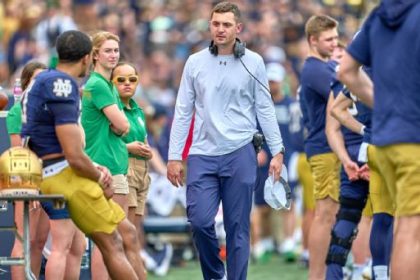Over the past few years, we’ve seen several players sign “statue contracts,” as one future recipient of such a pact, Fernando Tatís Jr., once termed it. The phrase does not have a precise definition, but it might plausibly cover contracts that last at least a decade and pay at least $200 million.
Tatís, 22 at the time, signed with San Diego in February 2021 for 14 years and $340 million. At 21, Julio Rodríguez signed with Seattle this past summer for at least 12 years and at least $210 million.
In the summer of 2020, Mookie Betts, soon-to-be 28, signed a 12-year, $365-million extension with the Dodgers. Last month, 29-year-old Trea Turner signed in Philadelphia for 11 years and $300 million, and 30-year-old Xander Bogaerts signed in San Diego for 11 years and $280 million. Carlos Correa, 28, also agreed to two statue contracts earlier this winter, but neither worked out. More on that later.
The latest entry into this club is Rafael Devers. The 26-year-old third baseman’s recent extension with Boston is worth 11 years and $331 million. Devers does not fit neatly into either of the two buckets of players that have recently signed deals like his. He’s not quite as young as Tatís or Rodríguez, and not quite as old as Turner or Bogaerts. But considering his entire profile, I’d argue he more closely fits into the former category than the latter.
The players can be grouped by potential. Evaluators overwhelmingly agree that at this point in his career, Bogaerts is who he is. It’s unreasonable to expect him to improve. Evaluators also agree the Rodríguez that at times dominated in 2022 is not his final form. The Mariners made him an offer based on that premise.
The Red Sox are betting, one year before he would have entered free agency, that Devers is still improving. That’s an obvious element of the Mariners’ deal with Rodríguez, and, to a lesser extent, the Padres’ deal with Tatís. The Dodgers, Phillies and Red Sox cannot reasonably expect the same with Betts, Turner and Bogaerts, respectively.
If Devers takes any more steps forward, it will dramatically increase the chances the Red Sox will be content with the contract. If he does not, he’ll have to stay remarkably healthy to give the deal any chance of being favorable to the team.
Consider that in Devers’ best season, 2019, he was worth about 5.4 WAR. Remember that the Red Sox opted against extending Betts three years ago, also one year ahead of his free agency. Betts’ best season then had been about doubly as valuable as Devers’. For his career to that point, Betts had been worth 7.3 WAR per 650 plate appearances; Devers has been worth 3.3 WAR by that same measure.
Betts’ deal is similar to Devers’, and both reportedly include deferred money. Choosing Devers over Betts (and, to a lesser extent, Bogaerts), as this Red Sox regime did, will only make sense if Devers advances from a star to a superstar.
Not all is lost for Correa with Twins deal
The star shortstop settled Tuesday for a six-year contract with Minnesota worth nearly 43% less guaranteed money than the deal he agreed to almost a month ago with San Francisco. This saga, of course, won’t go away even if Correa does pass his Twins physical.
That very word — “physical” — will be connected to Correa forevermore. So it’s worth pondering a bit more, while it’s so fresh, who all wins and loses here. Correa, clearly, lost $150 million of guaranteed money. But, with Minnesota, he will get to play his preferred position of shortstop. That wasn’t happening in New York, where Francisco Lindor is entrenched.
And if he plays like he expects to, he’ll make $270 million over 10 years. That’s not $350 million or $315 million, or even the $285 million the Twins were offering before all this began. But it’s still within the realm of possibility that Correa could out-earn at least the latter two of those offers. Justin Turner, who’s the same age that Correa will be in another decade, just signed for $21.7 million guaranteed. It’s conceivable a 38-year-old Correa could be worth more in 2032.
Obviously, though, the doctors employed by the Giants and Mets don’t think it’s especially likely.
Another low-key winner: the Mets and owner Steve Cohen. No, they didn’t get the star they sought. But they did sell plenty of tickets — more than $1 million worth on the day the news broke alone, according to the New York Post. Cohen’s commitment to winning was made even more obvious to fans, and, perhaps accordingly, Mets fans do not appear to be nearly as upset as, say, those of the Giants.
One last thought: Imagine what might have happened had Correa signed with the Twins a month ago. Could Minnesota have survived the fan outcry if it backed out of the deal because of issues uncovered in his physical immediately after successfully employing him? This might all have been avoided.
Executives and their favorite players
It can be fun when the world unfolds in predictable fashion. Within baseball, a frequent example is general managers acquiring players they once acquired during previous stints.
When Andrew Friedman took over the Dodgers eight years ago, his first trade was with his old team, the Rays. Since Chaim Bloom took over the Red Sox three years ago, he has acquired multiple players he helped bring to the Rays. And Mariners president of baseball operations Jerry Dipoto has re-acquired a number of players he was responsible for bringing to Arizona and Anaheim, his two prior homes.
With his latest example, Dipoto didn’t even bother hiding his interest. Seattle recently signed outfielder A.J. Pollock, whom Dipoto drafted as the Diamondbacks’ scouting director some 13 years ago. Dipoto had left for the Angels by the time Pollock debuted, but he will finally get to watch him play for his team in 2023.
Four years ago, Dipoto noted that he was convinced on draft day that Pollock was a sleeper.
“We thought you were gonna look at his career in the rearview after he’s spent 10 years in the major leagues and go, ‘Wow, this guy was pretty damn good,’” he said then. “That’s kind of how it’s turned out.”
And how’s this for a hint? Asked then for any players who compared to Pollock’s balanced but unexceptional skill set, Dipoto named only one: Mitch Haniger, whom he employed at the time.
This offseason, the Mariners lost Haniger but gained Pollock.
Pedro Moura is the national baseball writer for FOX Sports. He previously covered the Dodgers for The Athletic, the Angels and Dodgers for the Orange County Register and L.A. Times, and his alma mater, USC, for ESPN Los Angeles. He is the author of “How to Beat a Broken Game.” Follow him on Twitter at @pedromoura.
Top stories from FOX Sports:

Get more from Major League Baseball Follow your favorites to get information about games, news and more











